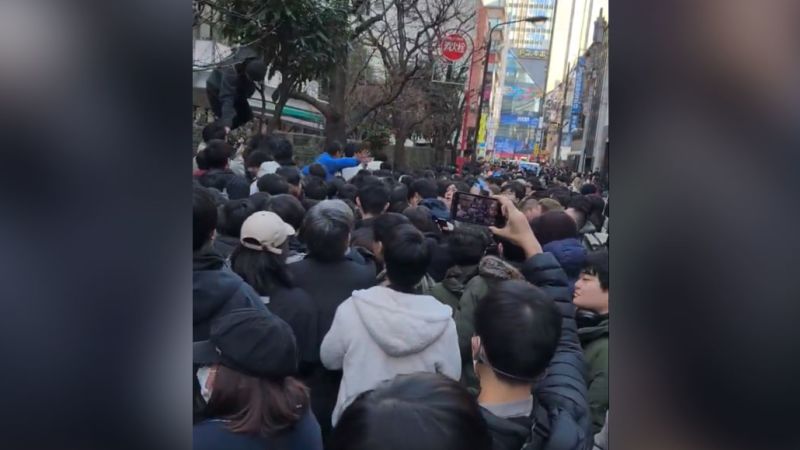An electronics store in Tokyo recently found itself in the eye of a whirlwind caused by a surge of Chinese buyers eager to acquire the latest Nvidia gaming chips. This fervor for tech products relevant to the ongoing U.S.-China tech rivalry culminated in chaos in the Akihabara district, a hot spot for video games, manga, and anime. Hundreds of eager customers stormed the store, creating scenes that would eventually go viral on social media, drawing attention to how geopolitical tensions are reverberating through consumer behavior.
The situation escalated so much that the electronics chain, PC Koubou, was compelled to cancel the day’s sales. According to the company’s statements, around 400 individuals showed up to gain access to the coveted GeForce RTX 50 graphics cards recently launched by Nvidia. The commotion that ensued obstructed public passageways and encroached on private properties, causing considerable concern among local residents. In response to the chaos, the store apologized, citing the distress caused to customers and the community.
PC Koubou’s director, Taizo Hashida, revealed that the overwhelming majority of the attendees were Chinese-speaking individuals, indicating the strong desire among Chinese consumers to access high-performance gaming technology. The RTX 50 series, released on January 30, is touted for its superior processing speeds and enhanced image rendering capabilities, which significantly elevate gaming experiences. However, these graphics cards are unavailable in China due to stringent U.S. export restrictions enveloping advanced technologies, further fueling demand in neighboring countries like Japan.
This absence of the RTX 50 series in China has led to a perception among gamers that they are receiving a diluted version of the technology. Nvidia has produced a slower version of the RTX 50 specifically for the Chinese market, which has disheartened many gamers who find themselves at a disadvantage. Analysts and experts in the tech sector emphasized the importance of access to these top-tier gaming chips, specifically pointing to their potential applications in developing powerful AI tools, making these items highly sought-after.
In light of this spike in demand, PC Koubou had previously arranged a lottery system for the RTX series, offering a limited number of units to winners. Unfortunately, unforeseen circumstances saw the turnout wildly exceed expectations, resulting in a chaotic scene that captured considerable media attention. Video footage showed frenzied buyers pressing into narrow spaces and surveillance of the local community, culminating in calls for orderly queuing that largely went ignored.
The situation became so untenable that the store opted for an online lottery system instead, aiming for a calmer sales methodology. Nvidia had previously tailored products for the Chinese marketplace in adherence to export regulations, such as last year’s RTX 4090D, which offered slightly reduced performance compared to its global counterpart.
From a pricing perspective, demand remains high across various platforms, with Chinese resellers capitalizing on the situation by offering these gaming chips at exorbitant prices. While the RTX 5090 retail price stands at $1,999 in the U.S., its cost could reach up to $5,700 through second-hand markets in China. The desperation for acquiring these gaming essentials is reflected not only in price but also in the lengths individuals are willing to traverse, as showcased by users on social media platforms who share tips for purchasing these chips globally.
In summary, the intersection of gaming culture and geopolitical affairs has cultivated a unique scenario in Tokyo, where the release of Nvidia’s cutting-edge technology ignited not only a consumer frenzy but also highlighted the broader implications of U.S.-China relations. As this dynamic continues to evolve, questions remain about how companies like Nvidia and the affected retailers will adapt to these shifting market demands and the growing complexities of international trade in technology.



